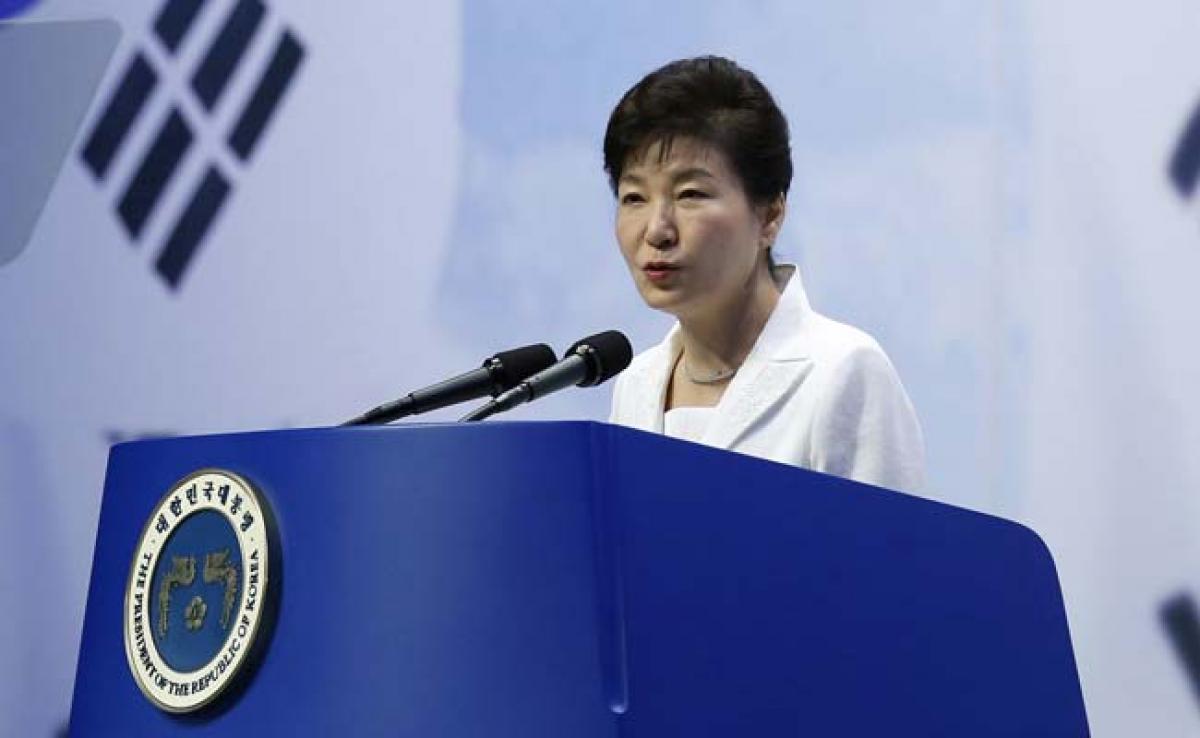Live
- Pokémon TCG Pocket to Introduce Card Trading in January 2025
- Nani unveils ‘MM 2’ title & first look
- Will challenge bail granted to actor Darshan in fan murder case in SC: Bengaluru Police Commissioner
- Chandrahass Launches Maruti Suzuki Dzire Through PJ Productions in Tolichowki Showroom
- Police case against farmers for tilling land claimed by Waqf Board in Karnataka
- Commendable move: Sandeep Dikshit on renaming Sarai Kale Khan ISBT chowk after Birsa Munda
- MahaYuti will come back to power with a thumping majority despite Oppn's tirade: Eknath Shinde
- ‘Hanging up my racquet. Thank you’ - India’s Prajnesh Gunneswaran retires from professional tennis
- Pawan Kalyan to Campaign for NDA Alliance in Maharashtra
- Eight killed, five injured in Nepal's traffic accident
Just In

x
Highlights
South Korean President Park Geun-Hye today urged Japan to match its words with deeds, after a speech by Prime Minister Shinzo Abe expressing remorse over wartime aggression fell short of Seoul\'s expectations.
South Korean President Park Geun-Hye today urged Japan to match its words with deeds, after a speech by Prime Minister Shinzo Abe expressing remorse over wartime aggression fell short of Seoul's expectations.
.jpg)
"History can never be covered up," Park said in a speech marking the 70th anniversary of Japan's surrender in World War II that ended its 1910-45 colonisation of the Korean Peninsula.
"History remains alive through its witnesses' vivid testimony," Park said, noting the suffering of South Korean women forced to work as sex slaves for the Japanese military in wartime brothels.
The president said Abe's much-anticipated statement on Friday had left "much to be desired" though she refrained from any specific critique.
While applauding Abe's vow that previous national apologies for Japan's aggression would stand, Park said Tokyo must follow-up such words with "sincere actions."
Even as she spoke, a pair of Japanese cabinet ministers visited the controversial Yasukuni shrine, which neighbouring countries see as an ugly symbol of Tokyo's militarist past.
Abe sent a ritual offering to the shrine which is dedicated to millions of Japanese who died in conflicts -- including more than a dozen war criminals.
The South Korean foreign ministry suggested that the visits and Abe's tribute jarred with the grief and remorse the prime minister had expressed in his statement on Friday.
Earning trust
"Japanese leaders can only earn trust from neighbouring countries and the international community when they show with sincere acts their reflection and remorse," the ministry said in a statement.
In her televised address to the nation, Park had particularly stressed the need for Japan to resolve -- as soon as possible -- the issue of the former sex slaves.
The so-called "comfort women" issue is an extremely emotive one in South Korea, where fewer than 50 of the thousands of women coerced into prostitution remain alive.
Abe had alluded to the subject in his speech, speaking of women behind the battlefields "whose honour and dignity were severely injured."
South Korea insists Japan has yet to fully atone for the suffering the comfort women went through and should offer further reparations.
Japan says the matter was settled in the 1965 bilateral agreement that restored diplomatic ties between the two nations, which saw Tokyo make a total payment of $800 million in grants or loans to its former colony.
The rift has prevented any summit meeting between Park and Abe -- an impasse that has frustrated the United States which would prefer its two key Asian military allies to focus together on containing an increasingly assertive China.
But Park did offer some hope of a thaw, saying that, despite all the difficulties, it was time the two countries "moved forward to a new future."
South Korean media reaction to Abe's speech was largely negative, with the largest-circulation Chosun Ilbo newspaper accusing the Japanese premier of wrapping his message of regret over past aggressions inside a shell of justification.
"This is unacceptable as a sincere apology and repentance for the Korean people who suffered from colonial rule," it said in an editorial.

Next Story
More Stories
ADVERTISEMENT
© 2024 Hyderabad Media House Limited/The Hans India. All rights reserved. Powered by hocalwire.com







